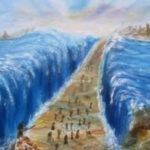From biblical history, we know the Christians of Asia Minor did not keep Easter in the Second Century A.D. They kept the Passover.
We know, too, Polycarp, the last known living apostle and student of the apostle John, held firm to his belief that the Passover should be kept on the 14th of Nisan, an observance he learned from John.
It was customary for the early Christians to celebrate the death of Jesus with a Pascha meal on the date of the Jewish Passover (1 Cor. 5:7-8), not Easter. The Easter observances came much later. “At first there was no annual celebration of the resurrection. Eventually, in the gentile world, the day of resurrection was added to the Pascha festival. That day was Sunday. At the Council of Nicea (325) it was ruled that Easter Sunday would be celebrated on the Sunday immediately following that full moon which came after the vernal equinox. At the same time, the Council decided that the vernal equinox would be March 21 in the Julian calendar (Eusebius, Vit. Const. 3.18). (Synder GF. Irish Jesus, Roman Jesus: the formation of early Irish Christianity. Trinity Press International, 2002, p. 183)
Around 150 A.D., Polycarp journeyed to Rome to meet Anicetus, regarded in Catholic circles as the 11th Pope, to discuss various heresies and not to change the Passover to Easter Sunday, which was already been observed in some areas.
Early church historian Irenaeus records, “For neither could Anicetus persuade Polycarp to forego the observance, inasmuch as these things had been always observed by John the disciple of our Lord, and by other apostles with whom he had been conversant; nor, on the other hand, could Polycarp succeed in persuading Anicetus to keep the observance in his way.”
The Christian leader Polycrates would confirm decades later that the Christians of Asia Minor would still keep Passover as Polycarp and other great men of God had done. The Catholic Historian Eusebius quotes a letter written by Polycrates where he affirms “We observe the exact day (14th of Nisan); neither adding, nor taking away.”
So, does the Holy Bible sanction a festival now known as Easter? Not at all. Some people believe Easter and Passover are the same festival, but far from it. Easter has roots in Ishtar or Eostre, a pagan fertility goddess; have you ever wondered what bunny rabbits or Easter eggs have to do with the death of the Christ? They came from this pagan goddess. What the bible teaches is the New Testament Passover; is it any wonder the bible describes Christ as “our Passover?” (I Cor. 5:7). Think about it! For more on this subject download FREE our booklets. How was Passover Replaced by Easter; Christ Our Passover; Should Christians Observe Easter?







Share This Article
Choose Your Platform: Facebook Twitter Linkedin